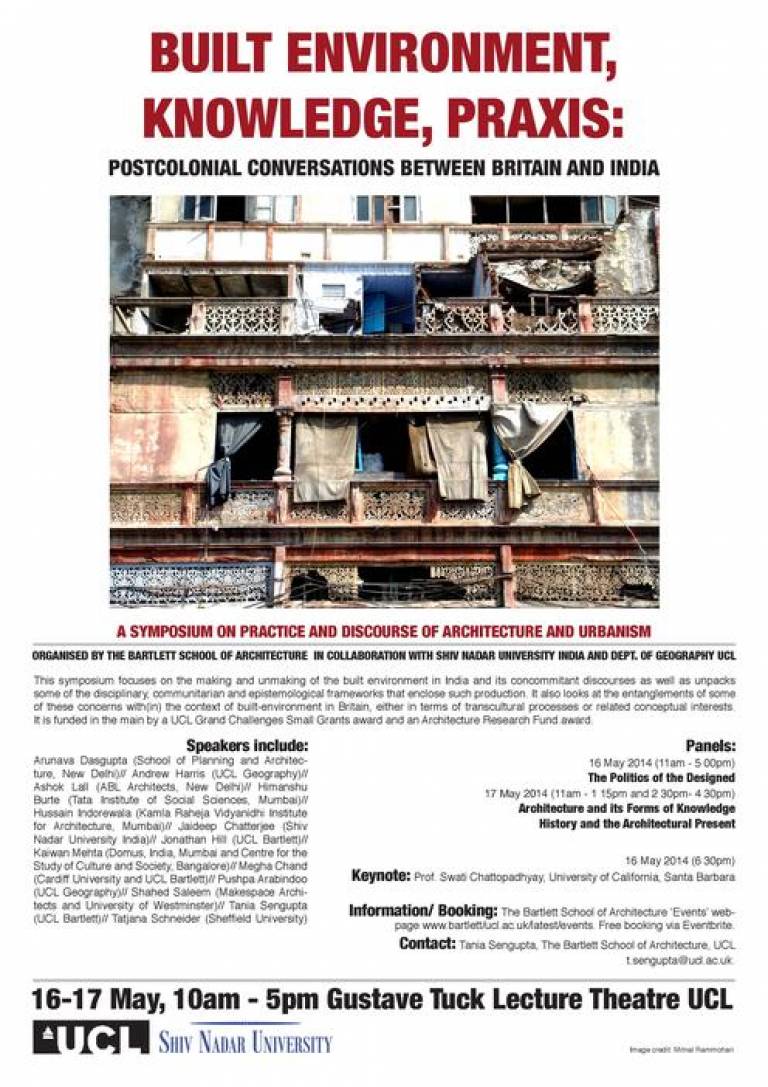Built environment, knowledge, praxis: Post-colonial conversations between India and the UK
16 May 2014–17 May 2014, 10:00 am–6:00 pm

Event Information
Open to
- All
Location
-
Wilkins Gustave Tuck Lecture Theatre, UCL, Gower Street, London, WC1E 6BT
The Bartlett School of Architecture, UCL will host a two-day symposium initiating a long-term critical and intellectual exchange between India and the UK focused on the knowledge, practice and discourse of the built environment.
This symposium focuses on the making and unmaking of the built environment in India and its concommitant discourses as well as unpacking some of the disciplinary, communitarian and epistemological frameworks that enclose such production. It also looks at the entanglements of some of these concerns with(in) the context of built-environment in Britain, either in terms of transcultural processes or related conceptual interests.
It is funded in the main by a UCL Grand Challenges Small Grants award and an Architecture Research Fund award.
The symposium is a
collaboration between Dr. Tania Sengupta (UCL Bartlett), Dr. Jaideep
Chatterjee (Shiv Nadar University, India) and Dr. Pushpa Arabindoo (Co-director, UCL Urban Laboratory). It is supported by a UCL Grand Challenges award and a
Bartlett Architecture Research Fund award. The panellists from India and
the UK include: Arunava Dasgupta (School of Planning and Architecture,
New Delhi), Andrew Harris (Co-director, UCL Urban Laboratory), Ashok Lall (independent
practioner and educationist, Delhi/ Mumbai), Himanshu Burte (Tata
Institute of Social Sciences, Mumbai), Hussain Indorewala (Kamla Raheja
Vidhyanidhi Institute for Architecture, Mumbai), Jonathan Hill (UCL
Bartlett), Kaiwan Mehta (Centre for the Study of Culture and Society,
Bangalore), Shveta Mathur (The Aga Khan Foundation, Delhi) and Megha
Chand (Cardiff University/ UCL Bartlett).
Keynote Lecture
Dr. Swati Chattopadhyay, Professor, Dept. of Art History, University of California, Santa Barbara on 16 May at 6.30pm in the Gustave Tuck LT.
Symposium panels
Panel 1: The politics of the designed (16 May, 11am - 5.30pm)
Over
the last two decades India's social, economic and political fabric has
been witness to profound changes. Central to these transformations is
the built environment which has emerged as the arena where diverse
discourses of neoliberalism, governmentality, development, security,
minority rights, disability, sustainability and ecology have laid their
claims as well as contested each other. This panel seeks to unpack how
architects, urbanists, governmental and non-governmental agencies and
various stakeholder communities in India negotiate this complex and
changing terrain, and also looks at the possible transcultural and
trans-contextual links of such issues in Britain.
Panel 2: Architecture and its forms of knowledge (17 May, 10am - 1pm)
This
panel investigates knowledges that ground Architecture as disciplinary
formation, as practice and as culture, i.e. how architecture
constitutes its object and domain and thereby (re)constructs,
(re)produces, sustains, and even contests itself. It also looks at how
the architectural artifact shapes and mediates various forms of
knowledge, and revisits some of the fundamental categories of
architectural knowledge (e.g. categories of design, space, temporality,
contingency, representation) to forge newer ways of reimagining the
field.
Panel 3: History and the architectural present (17 May, 2pm - 4.30pm)
This
panel investigates how the disciplinary frameworks as well as the
practice of architecture and urbanism in India today, deals with the
question of history, memory, past and present while also engaging with
descriptors of the present in order to understand the past. The
panelists will explore their own critical practice(s) on the notion of
archives, exploring alternative, everyday and minor histories,
transnational and transcultural circulations of
architectural heritage and expertise including, for
instance, artisanal practices and modes of translations.
The event is free, but you should book your place via Eventbrite.
Further information: Contact Dr. Tania Sengupta t.sengupta@ucl.ac.uk
 Close
Close

